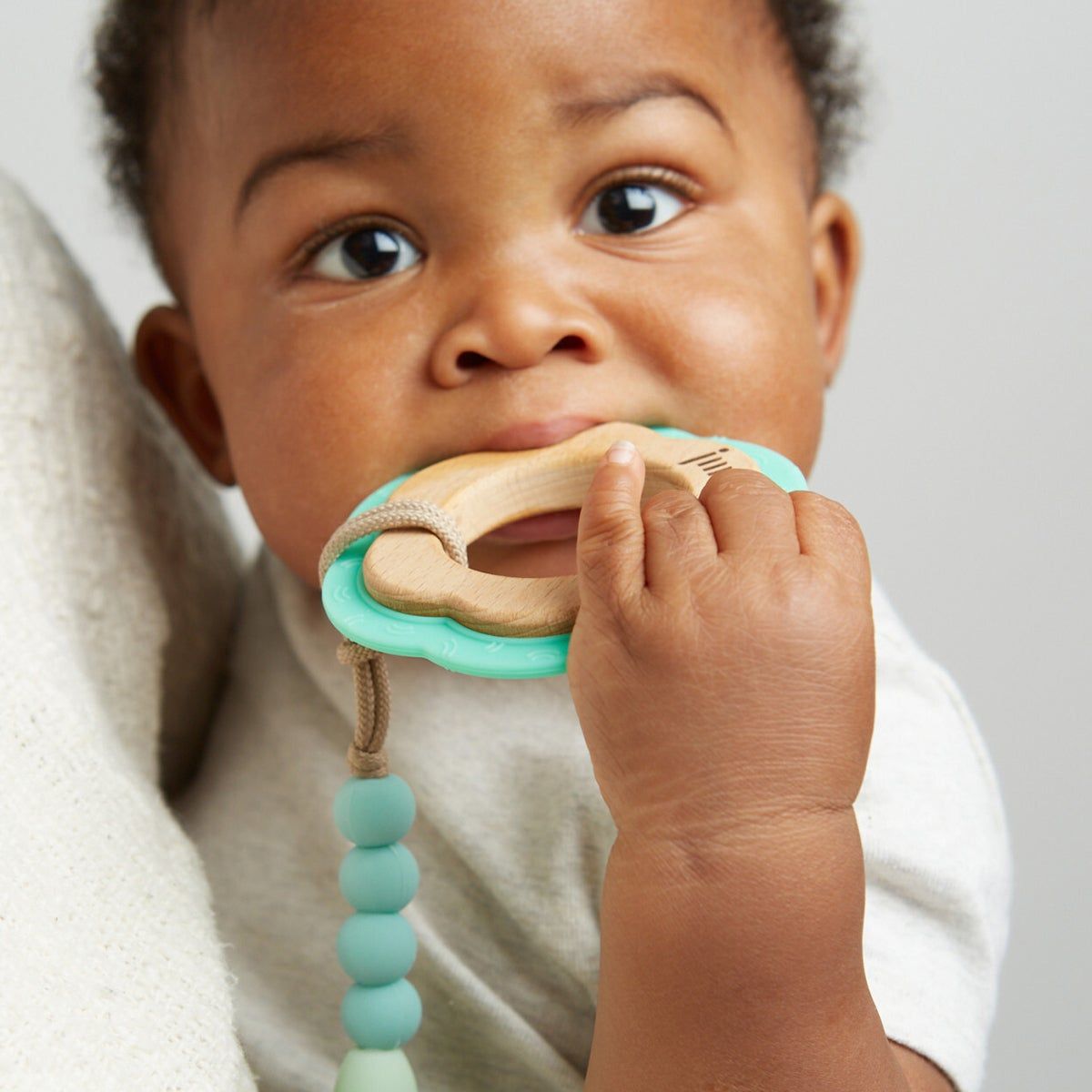
Parental Arts
When Babies Start Teething & What To Look For
Your baby’s smile gets even cuter when those first few teeth pop through. But getting there can be painful for your little one—and stressful for you. Whether you’re in the midst of teething or it’s on the horizon, we chatted with pediatrician and mom Dr. Krupa Playforth for answers to all your teething-related questions.
- Written By
- Marnie Schwartz
When do babies' teeth start coming in?
The first tooth typically breaks through between five and seven months, though Dr. Playforth says she’s seen it as early as four months and as late as around a year old. Typically, the two middle lower teeth come in first. By the time your kiddo is between 2 and 2.5 (sometimes up to their third birthday), their 20 primary teeth will come in. Most of the time, the “acute phase” (i.e. when the tooth is breaking through, and your baby may be uncomfortable) will only last a few days. But it’s possible to see swelling and then have days or even weeks go by before the tooth actually shows up. (If your baby has symptoms that persist and no tooth comes through, it may be worth getting them checked out to see if something else is going on, advises Dr. Playforth.)
What are the signs and symptoms of teething?
The symptoms of teething, like drooling and fussiness, are pretty elusive. (What baby doesn’t get fussy from time to time?) That’s why some parents tend to blame everything on teething. “But there are so many reasons a baby may be fussy,” says Dr. Playforth. “It could be gas, or sleep issues, or a developmental leap. Mouthing things is how babies explore the world, it doesn’t mark teething. And most babies drool.” To know if these symptoms are teething-related, consider the context. If they are fussy and have a fever, it’s likely not from teething. If they’re fussy and haven’t pooped in a few days, it could be constipation.
There are some clear signs that your baby is teething, though. Their gums might be a little red and swollen where the tooth is erupting, you may see raised bumps under the gum, or (most obvious), the first nubbins of teeth will poke through. Excess saliva can make their stools slightly looser, but true diarrhea isn’t caused by teething. And while it may raise your baby’s temperature ever so slightly, a true fever isn’t teething-induced either.
How can I soothe a teething baby?
Cold pressure will feel good in your baby’s mouth, so teething toys and other items to gnaw on can help. Here are some of Dr. Playforth’s favorites:
1) Teething toys that get cold when you put them in the fridge.
2) A cold washcloth. Wet a washcloth (choose one with a rougher texture), put it in the refrigerator until it’s cold, and then give it to your baby to chew on.
3) A cold pacifier. Just pop it in the refrigerator. (The cold doesn’t last that long, but can help take the edge off, especially as they’re trying to fall asleep.)
4) A mesh feeder. Freeze cubes of breastmilk or formula (or purees for an older baby), and give them to your baby in the feeder.
As for pain medication, like acetaminophen or ibuprofen (for babies 6 months or older), Dr. Playforth says it’s fine to use it for a few days, but to try to reserve it for when they really seem to need it, like for bedtime rather than all day long. What you don’t want to do is get into a pattern where you’re giving meds for several weeks straight. “If they’re really so uncomfortable all day, you want someone to look at them.”
There are also some remedies to avoid. For example, “there’s no evidence for teething necklaces, and they are a strangulation hazard,” says Dr. Playforth. You also don’t want to use honey or brandy, which is an old wives tale you may hear. Teething tablets or gels are also not advised.
Some babies sail through teething without much of a fuss, while others will get pretty cranky. If yours is on the grouchier end of the spectrum, know that it will pass. And remember, once your baby has teeth, it’s time to start brushing! Talk to your child’s dentist (they should start going once that first tooth shows up, or at least by their first birthday) about how to keep those teeth healthy.